 |
 |

Bromwich and his famous double handed backhand. |
"Brom" (Aus) (1918-1999) |
| John
Bromwich's name will always remain closely associated with Adrian Quist,
the doubles partner with whom he won 11 grand slam championships and a
multitude of mens doubles in the Davis Cup. He was also a remarquable singles
player although ultimately only managed to win one of the grand slam singles
tournaments pre second world war. In returning from the war some 6 years
later, he was both older had been wounded and had suffered from a very
bad dose of malaria. By 1939, particularly after his remarkable victory
over Parker in the Davis Cup, he was considered to be one of the top 5
players in the world, and at this stage he was only 21 years old...
Bromwich is one of the very few ambidexterous players to have succeded at the top level, together with the Italian de Stefani. Naturally left handed, he had a ferocious backhand with both hands although he would only serve with the right!! Tall, blond and very athletic, he was a man who didn't like to lose. He would stare out referees quite aggressively where their decisions were not in line with his own aspirations, don' t forget at the time it was totally unacceptable to call in question a referees judgement. Another curious detail is that he was the first player to put spare balls in his pockets and to hold only a second ball in his hand whilst serving. He would interestingly throw the second ball behind him on a successful first service in order to be in a position to use either hand in open play. From this point of view he was in advance of his time since the other great pre war players such as Perry would typically hold three balls in the hand whilst serving! Exceptionally Big Bill Tilden held as many as four balls!! |
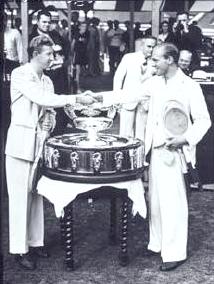
Budge et Bromwich before their Davis Cup singles match of 1938 |
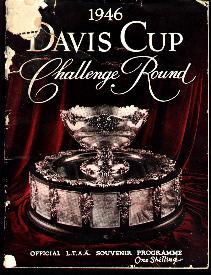
Challenge Round poster of 1946 |
John started his remarkable career in 1938 at the age of 20 by winning the mens doubles with Quist against Budge et Mako in the challenge round of the Davis Cup. This was although Australia went on to lose a tightly fought contest 3/2. He returned a hero of the next years competition reversing the result to 3/2 in their favour, having coming back from 0/2 down. John was overhead saying "In '39, our (the Australian) Tennis Association was too poor to send us to the French and Wimbledon (Championships). However, we knew we could win the Davis Cup since Budge (the American "Slammer") had turned professional and we had only just lost 2/3 the year before. Three weeks by boat to California, then the train to Philadelphia. War had been declared just before the matches began and everything was up in the air. We were surprised to be down 0/2 from the beginning and lacked confidence even after the doubles. But Quist was back again at his best to beat Bobby Riggs, in 5 (sets), winning 6/4 in the fifth having missed one matchpoint at 5/2! It was up to me against Parker. Our coach Fred Perry, told me to play systematically to Parker's forehand. That's exactly what I did. The first point lasted two minutes, the first game 13, and from there-on in his forehand came apart"...... Bromwich finally won 6/1 6/0 6/3!" |
| John
had a second phase to his career after the war that was particularly brilliant.
He triuphed at doubles across the world with parteners as divers as Sedgman,
Sidwell et, of course, Quist. After his own (against Kramer and Schroeder)
and Australia's defeat in the Davis Cup of 1946, remained firmly part of
the team until the trophy was won back in 1950. That year, in what was
his last Davis Cup match and together with Frank Sedgman, he won both the
doubles and with it the Cup.
Wimbledon would always remain his biggest disappointment. He'd never been able to go before the war because the Australian tennis association had not had adequate funds to sponsor campaigns on both the European and American circuits, the latter for the Davis Cup. Curiously for such a gifted player, he would only play there for the first time in 1947 at the age of 29. In 1948 he won both the mens and mixed doubles and only missed the triple crown by a single point. Frustratingly, Bob Falkenburg having saved three matchpoints in the singles final went on to win 7/5 in the 5th set... |
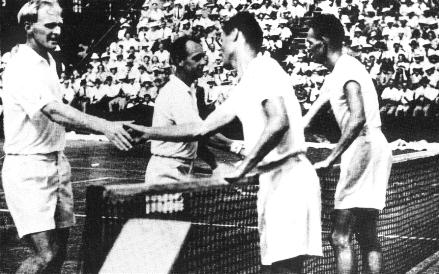
Bromwich, Quist, Schroeder and Kramer, Melbourne, 1946, after the Australians had just lost the Cup. This was also Bromwich's only defeat at doubles in the Davis Cup: he racked up 20 victories out of 21 matches! |
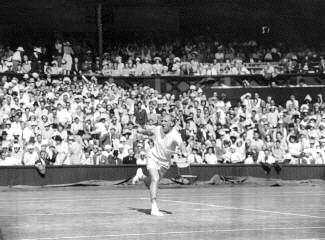
Bromwich on the volley at the Wimbledon final of '48 |
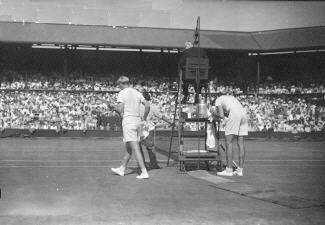
Bromwich and Falkenburg Wimbledon '48 |
| Here are his grand slam titles : 2 singles , 12 mens doubles and 4 mixed doubles together with associated partners |
| Australian Open | Mens Singles (2) | 1939, 46 |
| Mens Doubles (7) | 1938-39 A.Quist
1946-50 A.Quist |
|
| Mixed Double (1) | 1938 Mrs Wilson | |
| Wimbledon | Mens Doubles (2) | 1948 F.Sedgman
1950 A.Quist |
| Mixed Double (2) | 1947 L.Brough
1948 L.Brough |
|
| Championnats
d'Amérique
Forest Hill |
Mens Double (3) | 1939 A.Quist
1949 O.Sidwell 1950 F.Sedgman |
| Mixed Double (1) | 1947 L.Brough | |
| Davis cup (2) | 1939, 1950 |
Des idées, des remarques, des suggestions? E-mail
E-mail
Dernière mise à jour : 24
Mai 2000
Copyright BLANCHE NET communications.
Mars 2000.